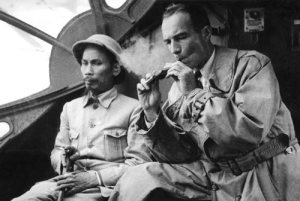On March 6, 1946, President of the Democratic Republic of Vietnam Hồ Chí Minh and Special Envoy of France Jean Sainteny signed an agreement that declared Vietnam to be a free state in the French Union.
On March 25, 1946, an American (military?) official sent a telegram back to Washington from Saigon in which he explained the views at that time of “prominent moderate Cochin Chinese,” that is, of prominent people from the southern third of what is now Vietnam.
This official stated that prominent moderate Cochinchinese believed that it would be best if the three sections of Vietnam (Tonkin, Annam and Cochinchina) were unified, but that prominent moderate Cochinchinese were “not inclined to work for this” because of the following three reasons:
1) People in Tonkin encouraged people in Cochinchina to resist the French, but then the people in Tonkin gave in to the French.
2) Because Tonkin was poor, people in Cochinchina would have to contribute a disproportionate amount of money in order to enable the country to function.
3) No great effort had been made by that time to include Cochchinese in the national government.
At the same time, this telegram reported that these prominent moderate Cochinchinese didn’t think that there was much of a future for Cochinchina as a separate state either, as they felt that such a polity would continue to be subservient to the French, as Cambodia was.
While it would be nice to know who exactly these “prominent moderate Cochinchinese” were, it is easy to imagine that there must have been people who thought this way.
What I find interesting about the information recorded here is the way that it combines idealism (the desire to see a unified and independent Vietnam) with a more practical view of reality (i.e., thinking about what their position would be in that future world).



